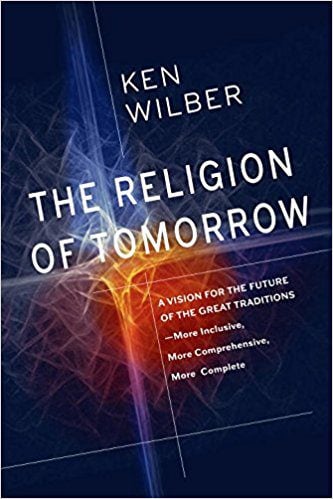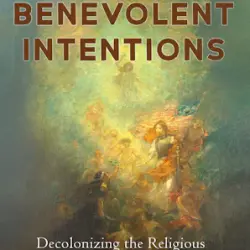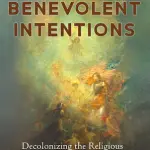Ken Wilber (1949-) is a contemporary American philosopher who has written a host of books related to what he calls Integral Theory. Wilber has a gift for synthesizing information across diverse fields of studies, and then designing helpful charts and graphs depicting how various intersecting systems can mutually inform one another. Along these lines, what might a “religion of the future” look like? What might it mean to practice a spirituality that takes seriously the paradigm-shifting discoveries of Copernicus, Darwin, Freud, Einstein, Hubble, and so many others?
 I have been reflecting on this question over the past few weeks as I have made my way through Wilber’s latest book The Religion of Tomorrow: A Vision for the Future of the Great Traditions. Unless you are feeling particularly ambitious, I would not recommend starting with this latest volume from Wilber because it’s a bit of a doorstop of a book, weighing in at more than 800 pages. In comparison:
I have been reflecting on this question over the past few weeks as I have made my way through Wilber’s latest book The Religion of Tomorrow: A Vision for the Future of the Great Traditions. Unless you are feeling particularly ambitious, I would not recommend starting with this latest volume from Wilber because it’s a bit of a doorstop of a book, weighing in at more than 800 pages. In comparison:
- The Integral Vision is a short, accessible introduction,
- Integral Spirituality is an earlier, much briefer (only 336 pages) book on religion, and
- Integral Life Practice is an accessible guide to putting Wilber’s theory into practice.
To give you a few highlights from Wilber’s latest book, he has four touchstones of what a “Religion of Tomorrow” might look like: waking up, growing up, cleaning up, and showing up. I will be focusing primarily on the first two: Waking up and Growing up. I have previously posted about “Cleaning up,” Wilber’s term for shadow work, which includes practices like therapy that help address the unconscious and repressed aspects of ourselves. And “showing up,” for Wilber, refers to the flourishing that can happen when we focus on the first three aspects of ourselves: Waking up, Growing up, and Cleaning up.
But let’s start with “Waking up.” As an entry point, many of you may know that Buddha is not anyone’s name. Rather, it’s a title meaning “Awakened One” given to a historical figure named Siddhartha Gautama. Similar to a Buddhist “Awakening” or “Enlightenment” experience, Wilber’s term “Waking up” refers to practices that help us progress through different “states” of consciousness.
The easiest state of consciousness to access is the “waking state.” That’s the one that presumably most of us find ourselves in right now, in which some combination of the five senses (hearing, sight, smell, taste, and touch) help us perceive the physical world. Hopefully no more than a few of us have drifted off in the last few moments of reading this post into the more subtle “dream state” of consciousness! Further, through spiritual practices like meditation, one can access deeper states of consciousness. To the extent that language can adequately describe such advanced states, some traditional descriptions include “pure empty Witness,” “unqualified pure Awareness,” and “unity consciousness” (86-88).
In an effort to describe the shifts in consciousness that can happen through practices like meditation, Robert Kegan of the Harvard Graduate School of Education, says, “I know of no better way to summarize development than that the subject of one stage becomes the object…of the next stage” (105). Let me say more about what that means. If you have experimented some with meditation, I suspect you have experienced—even if you didn’t know the name for it—what is sometimes called the “Witness.” Part of what one is doing during the early stages of learning to meditate is cultivating a capacity to witness the flow of various sensations—continually “arising and passing away”—that we have come to think of as our “self.”
A common part of the human condition is to become caught up in a cycle of unreflective stimulus-response. For instance, someone says something, and I react immediately with anger, sadness, joy, fear, or shame. In contrast, meditation can help you cultivate the ability to reflectively notice what is going on. As one of my meditation teachers says, we’re seeking to “Notice what we notice while we’re noticing it.”
When someone continually does or says something we don’t like, we can cultivate a capacity to notice what is happening—witnessing the situation and ourselves in it with curiosity and sometimes even equanimity. So instead of reacting immediately, for instance, I can become aware that I’m noticing anger rising up. I can feel my chest constricting. And underneath that, I can perhaps begin to sense some sadness at the loss of connection between myself and the other person. This more reflective response has the potential to radically shift our way of being and becoming in the world.
There’s a lot more to say about cultivating a Witness stance, but for now, let me push one step farther. Regarding how one moves beyond the Witness to the full potential of “Awakening” that Wilber calls “Waking up,” there is a famous saying by the late Katagiri Roshi (1928-1990), the founding Abbot of the Minnesota Zen Meditation Center, that “The Witness is the last stand of the ego.” While the Witness stance can retain aspects of subject-object dualism, “Awakening” experiences transcend duality, in what is sometimes called a nondual state: “pure empty Witness,” “unqualified pure Awareness,” or “unity consciousness.”
So, depending on your religious or spiritual path of choice, “Waking up” is all about practices that help shift you through states of conscious toward:
- Christian illumination, union, Christ-consciousness, or gnosis (“secret knowledge”);
- Buddhist nibbana, satori, kensho (various words about Enlightenment/Awakening);
- Jains kevala jnana (“absolute knowledge”);
- Hindu moksha (“ultimate freedom”);
- Islamic Sufis ma’arifat (“ultimate knowledge”) or fana fi Allah (“annihilation”);
- Jewish Kabbalistic Ein Sof (“oneness”);
- secularized “Big Mind / Big Heart.”
Despite the differences between these many traditions, all of these terms refer to “Waking up” into advanced states of consciousness.
(I will continue this theme tomorrow in a post on Is Your Religion “Grown up?”)
The Rev. Dr. Carl Gregg is a certified spiritual director, a D.Min. graduate of San Francisco Theological Seminary, and the minister of the Unitarian Universalist Congregation of Frederick, Maryland. Follow him on Facebook (facebook.com/carlgregg) and Twitter (@carlgregg).
Learn more about Unitarian Universalism: http://www.uua.org/beliefs/principles












